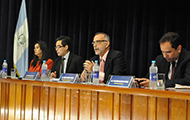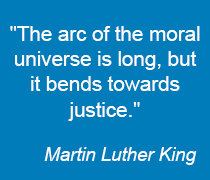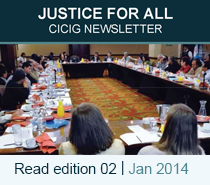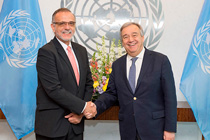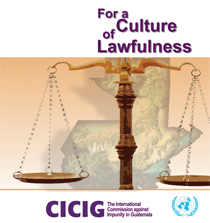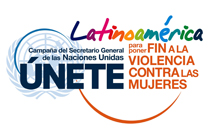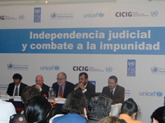 See video
See video
Guatemala, July 29, 2011. Representatives and delegates of international organizations recently participated in the conference "Judicial independence and the fight against impunity", where they agreed it would be necessary to professionalize judges in order to guarantee the impartialness of their work and efficient justice administration.
At the event, the following made addresses: Sergio Pinheiro, Commissioner of the Inter‑American Commission on Human Rights (IACHR) of the Organization of American States; Adriano González-Regueral, Representative of the United Nations Children's Fund (UNICEF); Aníbal Gutiérrez, Political Advisor of the International Commission against Impunity in Guatemala (CICIG); Xavier Michón, Country Director of the United Nations Development Programme (UNDP); and Carlos de la Torre, delegate of the Office of the United Nations High Commissioner for Human Rights (UNOHCHR).
The event was organized by UNICEF, UNOHCHR, UNDP and CICIG, with the aim of contributing to the discussion on judicial independence and thereby reducing impunity levels in the country.
Sergio Pinheiro, CIDH Commissioner, stressed that a judicial system must respond quickly, effectively and efficiently to crime victims, as well as expressing his regret regarding the lack of access to justice endured by all areas of Guatemalan society.
"Judges need to be professionalized in order to guarantee the independence and impartialness of their posts and strengthen justice [...]. Citizen security depends upon the independence of courts of law in complying with legal rights and ensuring individuals are given a fair trial," he stated.
Pinheiro believes judicial independence can only be achieved through the professionalization of judges in order to ensure victims of violence receive justice, which should be directly based on the law and not de facto powers.
"In a democracy, the legal system must be transparent, because no actions can be hidden from public view. Judges must be accountable for their actions and the judgements they deliver, because they form part of the democracy of any country," he added.
Citizen security
Pinheiro also referred to the 2010 report "Citizen Security and Human Rights", which addressed the Latin American violence and insecurity crisis and recommended that governments strengthened justice institutions.
"The report describes the basic human rights standards that must be upheld when addressing rising crime rates in the region. It also indicates that strict policies are not the solution to crime in a country, in that they violate the fundamental rights of citizens," he explained.
He described such public policies to be "ineffective, short sighted and suicidal" on the part of democratic governments and stated that the involvement of the army in citizen security affairs constituted a repressive measure, because such tasks are the sole responsibility of police forces.
Independence
Adriano González-Regueral, UNICEF representative, stated that all individuals have the right to an independent justice system that guarantees the effective protection of their rights and interests vis-à-vis any attack of people or legal persons, in both the public and private sector.
"In a country with high levels of social conflict and impunity, the Judiciary should play a very important role, because judges are responsible for resolving social, family, agricultural, criminal and civil conflicts through their judgements," he said.
Xavier Michón, UNDP Country Director, indicated that the United Nations continued to believe in the fight to achieve citizen security and ensure a fair dispensation of justice. Therefore he said that the UNDP would support justice administrators so that they could continue their hard work and improve processes to restore social peace, based on "serious, expeditious investigations and strong evidence, with the aim of achieving timely, full and transparent justice."
For these reasons, he stressed that judicial independence was a necessary part of ensuring the deliverance of justice in an impartial, responsible and transparent manner. Furthermore, he declared that judges should be subject to public accountability regarding the steps they take and the judgements they pass.
Aníbal Gutiérrez, CICIG Political Advisor, stated that in any democratic society, an independent justice system, respect for the rule of law, and the personal and legal security of citizens are of great importance. "In the absence of judicial independence, all individual guarantees are at risk; the justice system should ensure that the law is enforced," he said.
He quoted Juan Méndez, the former Commissioner of the Inter-American Commission on Human Rights, who said: "External independence is synonymous with a reduction in the vulnerability of the Judiciary to pressures of other branches of the Government, the military and influential private forces; the lack of independence is highlighted by external forces that fix appointments, have the ability to remove judges from their positions, ignore legal judgements, and also close courts."
Gutiérrez stated that such independence should not be viewed as an objective but rather a means of enforcing law in a fair and balanced manner. Therefore, structural reforms must be undertaken in the justice sector, covering the transparency of procedures to appoint judicial authorities; the extension of judge tenures, with internal regulations to punish any official that acts illegally; and the implementation of an accountability system for judges.
Carlos de la Torre, UNOHCHR delegate, said that only through the strengthening of justice institutions would it be possible to overcome the country's high impunity levels. "To fight this scourge, justice operators must be provided with the necessary guarantees to protect their independence from other State powers and from pressures imposed by de facto powers," he said.
He added that judicial independence should not imply judges acting in breach of legal control mechanisms provided for under systems of democratic accountability and public scrutiny.
"Every time a judge makes an arbitrary decision, it has a negative impact upon the rule of law, the legitimacy and the confidence surrounding a justice system. Furthermore, such decisions tarnish the image of judges who fully comply with their duties. Judges should ensure that justice is delivered in a full, objective and impartial manner," he concluded.


